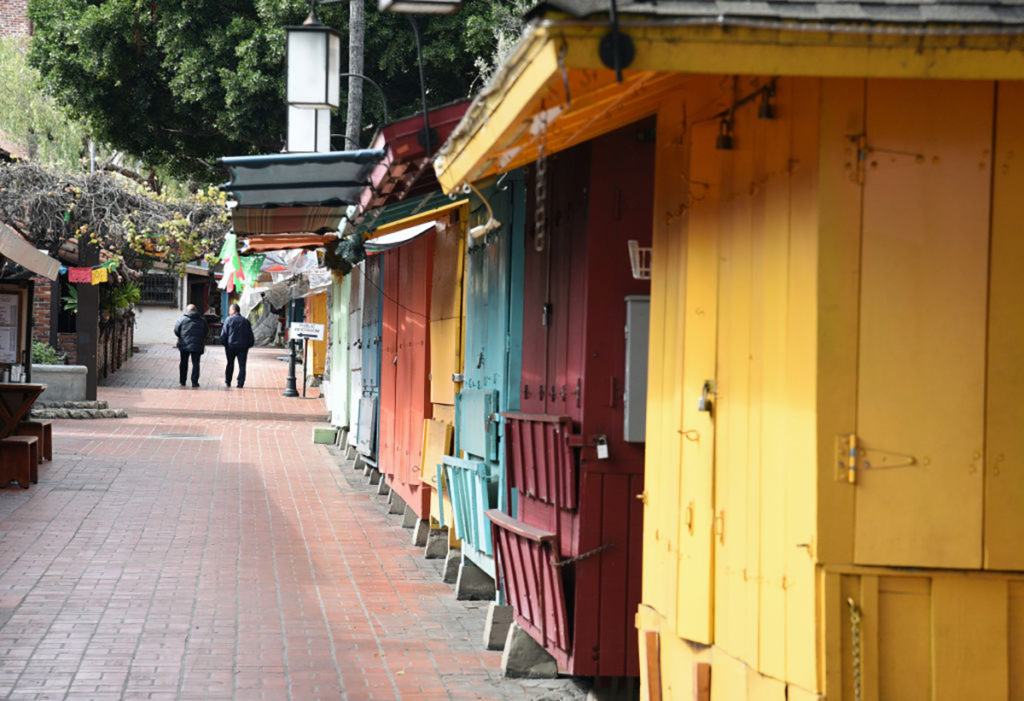
In 2010, Christina Mariscal-Pasten ’04 wrote a first-person account of her life growing up on L.A.’s Olvera Street. She also described the struggles faced by merchants and shop owners who’ve operated there for decades. With the coronavirus pandemic slashing tourism revenues in the city’s ethnic and cultural centers from Koreatown to Little Ethiopia, we asked Elizabeth Bromley ’20, editorial intern for LMU Magazine, to report on the impact of COVID-19 on one of L.A.’s prominent cultural sites.—The Editor
The future of Olvera Street, an iconic Los Angeles landmark and tourist center that opened in 1930, is now uncertain.
The Mexican marketplace, which is part of El Pueblo de Los Angeles Historic Monument, was closed March 20 in the Los Angeles COVID-19 shutdown. The dangers of the pandemic forced merchants, including families with alumni and parents connected to LMU, to cancel their celebrations of the cultural center’s 90thanniversary.
Today, a handful of the small restaurants are open for curbside pickup and takeout orders. Merchants and restaurant owners say their businesses are down 90 percent compared to this time last year.
Greg Berber, a third-generation Michoacán and a son of the late Henry Berber ’67, owns a Mexican restaurant on Olvera Street, claims the marketplace and its merchants are not getting enough support to maintain themselves.
“I think that if the city stepped up and at least acknowledged that we are not just tenants, but we are keepers of culture, keepers of tradition, they would realize the boost that would give us,” says Mariscal-Pasten.
“With the shutdown of city hall, downtown businesses and the churches around us and with tourism coming to a halt, it basically turned off the faucet on us because that’s what supported Olvera Street,” says Berber.
Although merchants are eager to open, many shop owners are older than 50 years of age and therefore at higher risk of contracting the coronavirus.
Christina Mariscal-Pasten ’04 traces her family’s Olvera Street roots back six generations, the oldest family there.
“I think the merchants really want to get back to work, but we have older folks,” she says. “In the case of my parents, for example, they’re both over 60. Especially my dad — he’s in that high-risk group: with previous medical conditions. Being exposed to people on a daily basis puts him in a tough spot to be able to open their business every day.”
Though some business owners hope to reopen, several shops likely will close permanently. Some merchants do not have an income or are afraid to open. They also say they’ve received little explanation from the historic monument officials regarding what further safety protections will be available to them and their customers.
For example, shop owners want to know if security will be posted at every entrance and exit to make certain people are wearing face masks and if the city will be providing hand sanitizer stations.
Since the merchants and their businesses operate within the context of a historic monument, the responsibility for protective measures is more complicated than those facing independent business owners elsewhere in the city.
“As a monument, it’s their responsibility to make sure that the people coming in and out are safe and that were safe,” says Mariscal-Pasten.
However, even with the proper precautions merchants are projecting major hits in income for the foreseeable future because tourism is down, summer camps that bring children to visit are discontinued, and large cultural events at Olvera Street, such as the Day of the Dead celebration, are canceled.
“My concern is that if the city doesn’t help La Placita Olvera that we could lose it, because one of the things that makes Olvera Street what it is, is merchants and the people who run it,” says Berber. “We’re the ones that throw the cultural events, so there’s a great fear that we’re going to lose all of that if the city doesn’t come to the aid of Olvera street.”
Uncertainties of that sort led merchants to initially push for rent forgiveness this past April and May, with the hope of reopening in June, and merchants have shared their wishes with the Los Angeles City Council.
“We’ve been requesting that they … give us rent forgiveness for at least two months, but we’ve been asking for much more because this is going to be an impact that’s going to last for the rest of this year and maybe further into next year because we don’t know when the tourism dollars are going to be coming back into L.A.,” says Berber.
The issue is further complicated by the fact that Olvera Street’s council representative, José Huizar, who had supported merchants’ calls for rent forgiveness, was arrested on June 23 by the FBI on racketeering charges.
“I think that if the city stepped up and at least acknowledged that we are not just tenants, but we are keepers of culture, keepers of tradition, they would realize the boost that would give us. And we would happily announce that to the public, to say the city stepped up and helped us,” says Mariscal-Pasten.
Elizabeth Bromley ’20 was an LMU Magazine editorial intern during the spring 2020 semester. A journalism major in the LMU Bellarmine College of Liberal Arts, Bromley interviewed Carla Bittel, professor of history, about the COVID-19 pandemic and the history of viruses. Follow her @LizBroms.
